Camper conversions business LowLife Products boosts its manufacturing capabilities
The Overview
Launched in 2016, Cheshire-based LowLife Products designs and manufactures elevated roofs and furniture for the leisure vehicle industry. One of its most popular products is its ‘Stealth’ elevating roof, which transforms standard VW Transporter vans into four-birth campers.
LowLife was founded to offer an attractive alternative to existing camper van roof conversions that were already on the market. With a background in aerospace engineering, the teams dedicate their expertise to designing new state-of-the-art, low-profile elevating roofs.
“Thanks to the Phil's guidance, we were able to secure much-needed funds to not only bolster our productivity, but also to increase our sustainability. Phil understood exactly what we needed and created a tailormade plan for securing the right funding."
Andy Gosling, director and co-founder of LowLife
The Challenge
At the time, LowLife Products used resin infusion, a time-consuming, hand operated process, to manufacture the parts required for their products. This produced a lot of waste material, as the consumable items used were disposed of after each part was manufactured.
Andy (pictured above right) approached the Manufacturing Growth Fund for support after identifying a way to streamline the process and boost LowLife’s productivity and sustainability by manufacturing new parts using silicone bags. LowLife needed to purchase a new mixing and spraying machine to implement the process and sought support to fund the equipment.
The Solution
Andy was introduced to Phil Anders, specialist advisor for the Manufacturing Growth Fund in Cheshire and Warrington.
Phil supported Andy in creating and submitting a successful application for the fund, which awarded Andy a grant of almost 50% of the total project costs.
Thanks to this grant, Andy was able to purchase the materials required for the new machinery, and action the streamlined manufacturing process. This increased LowLife’s manufacture rate by 50% per week and created a cost saving of £20 per part made from ancillary items.
Following the Hub’s initial support, LowLife now has plans to launch new products in 2020 and is using cutting-edge 3D laser scanning technology to streamline processes even further. The business is also looking into recruiting more staff thanks to the increased demand for its products.

© LowLife
Andy Gosling said: “Phil’s assistance throughout this process has been invaluable and as a result, we can now better respond to growing demand. The 3D scanning and design technologies that we are introducing will also give us total freedom to design the products we want to see, allowing us to focus on innovating the business even further.”
Phil said: “The team at LowLife had already proven that they had the ideas and expertise to produce top quality modified vans, however, they were hindered by the production process and needed to invest in order to reduce unnecessary waste.
“With dedicated, sector specific support, we identified the problem areas within the business and took steps to solve them, starting with funding. In a series of one-to-one meetings, we mentored LowLife Products on how to ensure their grant application was successful. We’re thrilled that the funding has made such a difference to the business and look forward to seeing what new products LowLife come up with next.”
